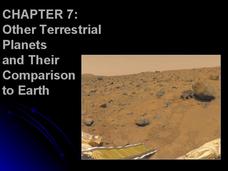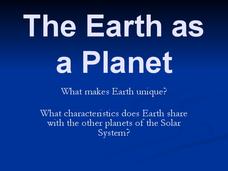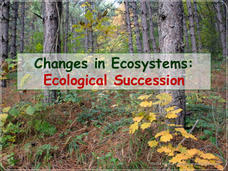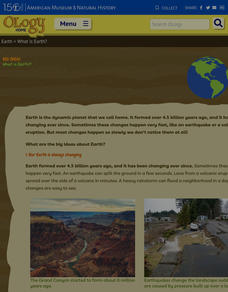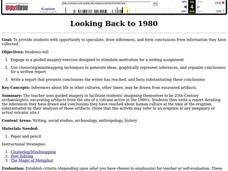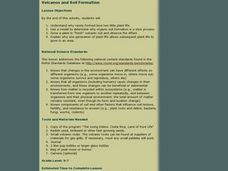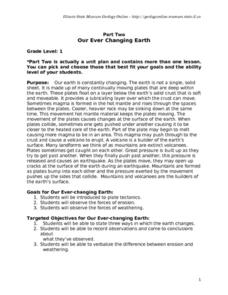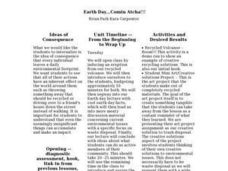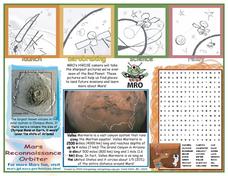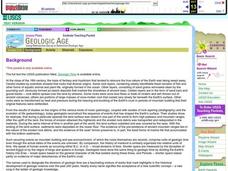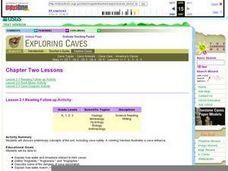Glynn County School System
Terrestrial Planets
Mercury, Venus, Earth, and Mars are collectively known as the terrestrial planets. Although part of the same group, each planet has its own set of characteristics. Scholars explore the characteristics that make the planets unique and...
Glynn County School System
The Earth as a Planet
What does our planet have in common with other planets? What makes it unique? Find out in a PowerPoint presentation highlighting many earthly facts! The lesson describes Earth's atmosphere in detail and adds many other important facts...
Glynn County School System
The Outer Planets
Are outer planets just like inner planets? Nope! The outer planets are much more spread apart than the inner planets. An informative PowerPoint presentation shows why this is true as well as facts about the individual planets in the...
Biology Junction
Changes in Ecosystems: Ecological Succession
Can an area with no soil turn into a forest? Scholars learn about the process of ecological succession using an interesting presentation. It covers both primary and secondary succession in the building of new ecosystems.
NOAA
The Incredible Carbon Journey: Play the Carbon Journey Game
Class members explore the carbon cycle in the final installment of the 10-part Discover Your Changing World series. They play a simulation game where they walk through the steps carbon takes as it cycles through the different layers of...
American Museum of Natural History
What is Earth?
Humans have only inhabited Earth for a short part of its existence. An online resource explains how scientists use clues from rocks and fossils to piece together information about Earth prior to humans. The online instruction includes...
Curated OER
Looking Back to 1980
Pupils use clustering/mind mapping techniques to generate ideas, graphically represent inferences, organize their conclusions and write a report that presents conclusions the writer has reached, and facts substantiating those conclusions.
Curated OER
School Site Ecosystem
Fourth graders are introduced to the concept of ecosystem; specifically, the interrelationships among plants and animals within an ecosystem, and their relationships to the environment in which they live and interact.
Curated OER
Why So Many Frogs?
Students explain the different stages in the growth of a frog, then analyze and collect data to make generalizations about a larger population. They determine the survival rate of a population of tadpoles under controlled conditions.
Curated OER
This Is Tanzania
Students study the volcanic history and the wildlife of Tanzania. They examine how most Tanzanians live on a subsistence agricultural economy.
Curated OER
Earth Movements
In this earth science worksheet, middle schoolers use the sheet for reinforcing vocabulary and core concepts. The answers are found and reviewed for the attainment of new knowledge.
Curated OER
Our Ever Changing Earth
First graders study ways in which the earth changes due to erosion and weathering in this series of lessons.
Curated OER
Plate Tectonics & Land Forms
Fourth graders discuss the different interactions of plates and the ways mountains are created. In this plate tectonics lesson students complete an activity in groups.
Curated OER
Eyewitness Accounts
Students use eyewitness accounts to gather and evaluate information about the events of the May 18, 1980, eruption of Mount St. Helens. They play the following roles: reporter(s), eyewitnesses, and scientists who are investigating the...
Curated OER
Earth Egg
Students discuss plate tectonics and the layers of the earth's interior. They use eggs as models of the earth and answer questions regarding which part of the egg would represent which part of the earth.
Curated OER
Earth Day...Comin Atcha!!!
Pupils explore the idea of consequence that every individual leaves a daily environmental footprint. They read articles about creative solutions to solid waste issues and then create an artwork from household trash.
Curated OER
Rocks and Minerals
In this earth science activity, students use the clues given at the bottom of the sheet to solve the crossword puzzle on mineral and rocks. They identify the various types of rocks formed and specific examples of these rocks.
Curated OER
Mars Reconnaissance Orbiter Fact Sheet
For this space worksheet, pupils will read facts about Mars and the Mars Reconnaissance Orbiter. Students will also find 24 space related words in a word search.
Curated OER
The Ocean Floor
Practice reading comprehension by approaching oceanography through 2 pages of informational text. The text compares the ocean floor to the Grand Canyon to gives learners perspective, and gives a brief coverage of the earth's crust and...
Curated OER
Changes Written in Stone
Earth Rocks! Explore the many properties and types of rocks, where they come from and how they are formed. This resource presents a simplistic overview of the rock cycle. Tip: Bring in samples of sedimentary, metamorphic, and igneous...
Curated OER
Geologic Age
Students investigate radioactivity as a tool for measuring geologic time and how geologists use this information to determine the absolute age of rocks or minerals.
Curated OER
Reading Follow-up Activity
Students color a worksheet while discussing characteristics and composition of caves.
Curated OER
Aerosol Lesson: Science - Graphing SAGE II Data
Students examine and plot atmospheric data on bar graphs.
Curated OER
Crashed on the Moon
Students compare and contrast the environments of the moon and the earth. They discover how the differences might change one's daily activities.
Other popular searches
- Types of Volcanoes
- Volcanoes and Earthquakes
- Shield Volcanoes
- Erupting Volcanoes
- Composite Volcanoes
- Internet Research Volcanoes
- Volcanoes Earthquakes
- Caribbean Volcanoes
- Ice Land Volcanoes
- And Volcanoes
- Spanish Volcanoes
- Three Types of Volcanoes


